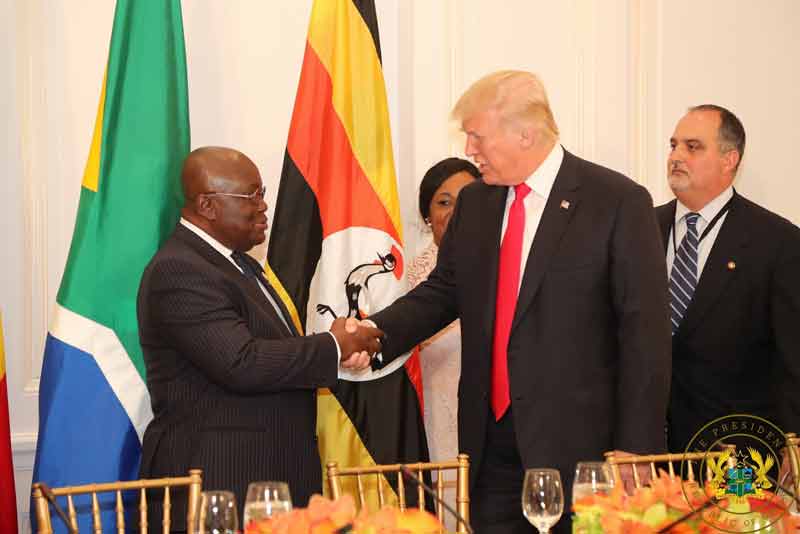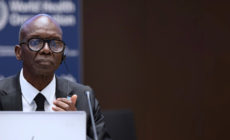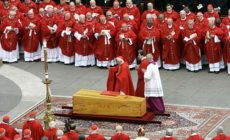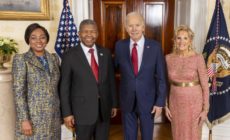Donald Trump has good plans for Africa – Prez. Akufo-Addo
- Posted on
- Comment
 President Akufo-Addo has declared his willingness to support United States President Donald Trump on his ‘African Agenda.’
President Akufo-Addo has declared his willingness to support United States President Donald Trump on his ‘African Agenda.’
Contrary to the impression the US President has left on the minds of many Africans, President Akufo-Addo thinks the man has good plans for the continent for which he has pledged to support him (Trump) for the growth of trade and investment in Africa.
He made the observation during an interaction with some members of the presidential press corps at the Flagstaff House in relation to his meeting with the US President on the sidelines of the just-ended United Nations (UN) General Assembly meeting in New York together with seven other colleague African presidents.
Pledging to support President Trump, Nana Akufo-Addo said, “I had the opportunity and privilege to meet the new US President, Donald Trump, and I believe this is the first time we hear him articulate an Africa policy…because he had not talked about Africa.
“The policy that emerged from our discussion was that he recognized the tremendous potential of Africa for the development of our economies and his attitude was that United States should be very engaged in promoting trade and investment in Africa and as it were, shifting from the aid mentality, culture, consciousness.”
President Akufo-Addo posited, “I welcomed it because I myself feel that the aid culture and dependency has not served us particularly well and these are times for us to move away from it.”
Paradigm Shift
“So it was good to hear an American president say that now American policy had pivoted from focus on aid to focus on trade and investment because at the end of the day, it’s the most sustainable basis for long term economic engagement between countries when we are talking about trade and investment and not about aid,” the Ghanaian leader pointed out.
In August 2006, the United States government, through the Millennium Challenge Compact (MCC), signed a five-year $547 million compact with the Ghanaian government to reduce poverty by raising farmers’ incomes through private sector-led agribusiness development and major public projects in the capital of Accra.
The compact consisted of a three-pronged series of investments in 30 districts across the country.
The agriculture project was designed to enhance returns from staple food and horticulture crops produced by low-income smallholder farmers, as well as to support the expansion of higher-value commercial agriculture through improved delivery of business and technical services.
The transportation project was designed to reduce costs related to agricultural commerce at local and regional levels.
And the rural development project was to strengthen rural institutions providing complementary and supportive services for agricultural and agribusiness development.
Expectation
But going forward, President Akufo-Addo maintained, “We are going to see to what extent the new programmes that the American government will put out in the weeks, months, years ahead to reflect this new focus of President Trump; we will see the programmes and initiatives that they are going to put out. We are ready on our part to participate and partner the United States if this is the focus of American policy and leadership.”
He averred, “I was reassured by his emphasis on the importance of democracy, a vehicle for promoting human happiness, respect for freedoms and respect for the rule of law and that emphasis is one that accords very much with what we have been trying in the period of the Fourth Republic to do here in Ghana.”
Impression
Even though President Akufo-Addo agreed that Ghana is bound to have issues with the United States in the area of immigration for instance, he noted, “I believe that the manner in which President Trump went about his interaction with the eight African leaders he met suggests that there will be space for us to look at these differences in a constructive manner.
“I think that I’m right in saying that he made good impression, largely because of his attitude (‘…don’t know too much about your place but I’m prepared to listen; that is really your purpose of coming here’),” he spoke of the US president.
That, he said, was because “I saw that that is something that disarmed virtually everybody,” [referring to himself and his colleague presidents] “around the table…it even prompted one or two of them to say that in recent times they had never had such an encounter with an American president so intimate; it was said by one or two of the long-serving presidents around the table that in their period in office, they had never had such an encounter.
“I think everyone around the table left with a good impression and that we are now in the position to engage; there is a framework of policy that we can look at and engage with and for myself… I’m more concerned about what we can do by way of promoting trade between the United States and our various countries, what we can do to promote investment…I think all that is defining the direction of American policy is welcome.”
UN Experience
He also talked about his experience at the UN as President of the Republic of Ghana.
Even though Nana Akufo-Addo has been to the UN meetings several times as foreign affairs minister, he said this time round, he saw the qualitative difference between going to the UN as foreign minister and president.
“As foreign minister, you have responsibility for a specific area of government life; President, you have responsibility for all aspects and it has a big impact on the way your time is scheduled and the number of people who want to see you,” he emphasized.
Aside that, he said, “The opportunity also to speak for the first time as president before the United Nations is something that was a big privilege for me.
For him, “That’s something that was different. I didn’t have a spare moment in these six days that I was in New York because people are there to see you all the time. It’s very exhilarating, especially [the fact that] I have a distinctive impression that somehow we are really back on the radar of global and international attention.”
He believes that that was the reason why lots of leaders and international organisations wanted an opportunity to meet him for discussions.
By Charles Takyi-Boadu, Presidential Correspondent










 (Selorm) |
(Selorm) |  (Nana Kwesi)
(Nana Kwesi)